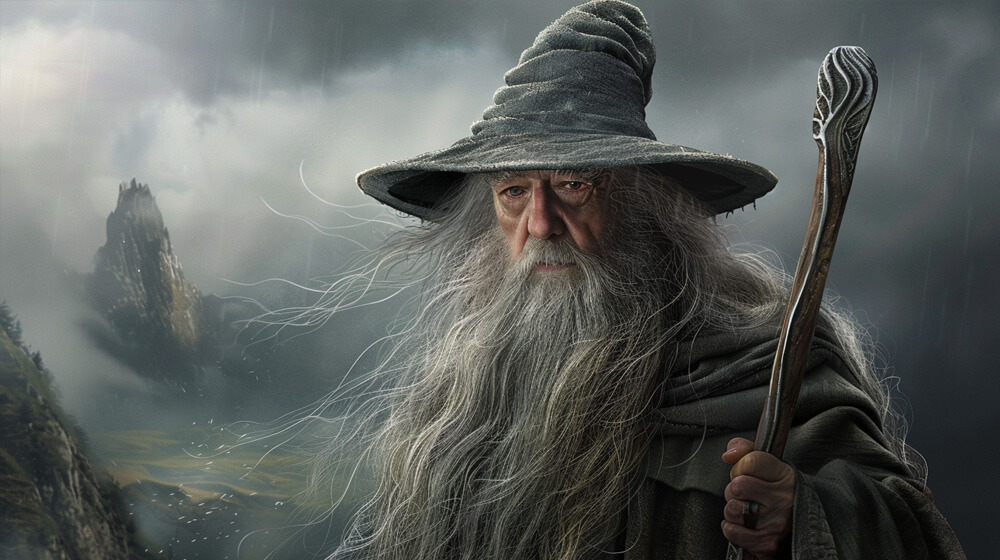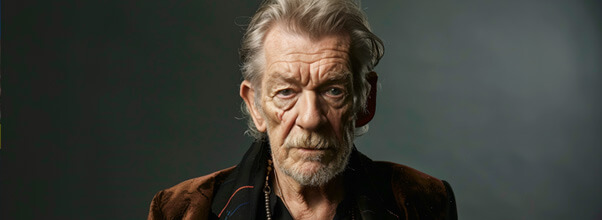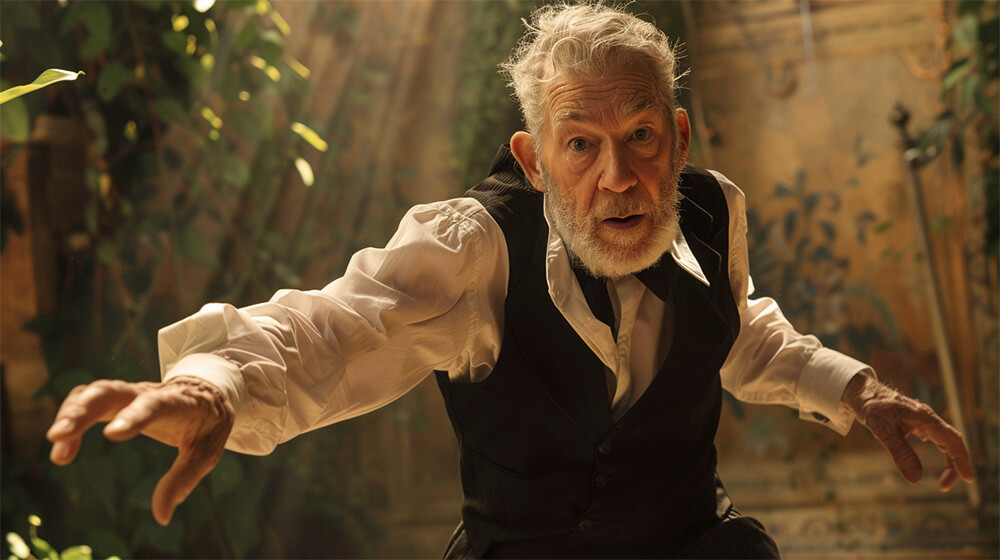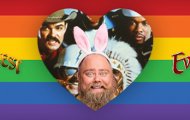In 2000, Ian McKellen freshly cast as Gandalf the wizard in Peter Jackson’s upcoming Lord of the Rings trilogy of films, published an article entitled: A Gay Gandalf: Homophobia is Everywhere. For a Tolkien fan, that era was a time of heady anticipation as they were thrilled that J.R.R. Tolkien’s masterpiece would finally be made into three films.
At the time, most Tolkien fans probably didn’t know who Ian McKellen was. They certainly didn’t know that he was a flaming homosexual. However, Ian made damn sure everyone knew he was one of them after he published his infamous article.
The title betrays the game: the spurious claim that homophobia is everywhere. It is just not true. The term is bogus from the start as it mischaracterizes opposition to homosexuality as being people who are afraid of it. The phobia part of it assumes that the fear is unwarranted. Most people who oppose the LGBTQ agenda do so because they believe it is wrong and unnatural. The pride extremism we see all around us and the current transgender crisis is proof that the fears of a majority of Americans were well founded.
The Gay Gandalf in the title is extremely disrespectful to Tolkien, Peter Jackson, and the fans. Gandalf was not gay according to Tolkien. He didn’t need to go there, but he did. He did it to stoke outrage and generate controversy.

In the piece, McKellen focuses on how victimized he is as a gay man. Going back and reading his other writings on the site, he is obsessed with homosexual activism and plays the victim card incessantly. Nowhere in his writings does he show any appreciation or gratitude for being cast as the venerable wizard Gandalf which would eventually become his most famous role that would be the reason he would be knighted by Queen Elizabeth II. The navel-gazing MacKellen is incapable of demonstrating a modicum of grace and class.
Perhaps the most shameful part of his article is the final paragraph where he blames people in unmentioned “chat rooms” for their anti-gay comments regarding his casting as Gandalf in the Lord of the Rings films:
So, taking a less momentous example, it was unsurprising that an uncensored Internet should recently criticise my casting as Gandalf in homophobic terms. Cranky anti-gay remarks in chat rooms remind me of verbal abuse in the playground – not that that didn’t hurt too. Many unthinking people just don’t like the idea of gays joining in their games, nor in the military and, it would seem, in the movies.
Oh, the poor little luvie.
Let’s analyze this paragraph in depth. He talks about an “uncensored Internet” as if that’s a bad thing. He could have mentioned the internet without qualifying it as uncensored but he did not. I wonder would he have preferred a censored Internet? Is McKellen afraid of free speech? Actors are being criticized all the time by professional drama and film critics? Does he not see the contradiction in implying that he wants the press censored but allowing actors to act should be free from censorship?
He provides no proof of the alleged remarks made in the Internet chat room. Where did this happen? When did this happen? Who said these things? McKellen expects us to believe him — a homosexual activist — at face value. While he is right that a significant number of people don’t like gay people and don’t want to see visible gays in all walks of life, that is a reality that has nothing to do with Lord of the Rings.
McKellan is openly gay and was not “outed” by Tolkien fans. Many gay people are in the closet and prefer not to share their sexuality in public. McKellan made his homosexuality an issue so he has no reason to complain if people are critical of it. He can’t have his cake and eat it.
During the heady beginning years of the Internet, it was common to bring up the boogeyman of so-called chat rooms as dens of evil and conspiracy theories. As a young adult before the Internet was invented, I do remember chat rooms but they were hosted on private bulletin board forums that were privately owned. Computer users had dial-up modems and would connect to a host, log on with their credentials, and enter a private chat room.
Sadly, hate crime hoaxes are a part of everyday life. These hoaxes are being perpetrated all the time because as British gay conservative intellectual Douglas Murray has remarked there is not enough supply of hate to meet the demand of activists who are trying to stop hate. To see how pervasive they are, here is a good database of thousands of hate hoaxes.
If some people made anti-homosexual comments about him because he was cast as Gandalf, they would be outliers and they would not be representative of most Tolkien fans who were happy that an accomplished British actor of film and stage had been chosen by Jackson to play the mercurial wizard. To my knowledge, no polls were ever commissioned about Ian MacKellen’s homosexuality impacting his ability to play Gandalf convincingly.
At the time, many in the public knew that various rock stars and film actors like Elton John, Freddie Mercury, and Rock Hudson were homosexuals. While it was not an optimal situation, many people just forced themselves to suspend their disgust and appreciated the art for its intrinsic value and not because of the sexual proclivities of the artist.
The unfortunate conclusion to his article seems designed to draw attention to himself and his cause. As an avid Tolkien fan at the time, I recall being delighted with Peter Jackson’s decision to film the Lord of the Rings trilogy. I had no idea who McKellan was and that he was a practicing open homosexual. It was McKellen himself that made it an issue not people in imaginary internet chat rooms.
Other parts of the article are full of logical fallacies and outright lies. For example, McKellan brings up the murder of Mathew Shephard.
My point is that Clinton was not defeated by the reasoned arguments of political opponents but was a victim of the same homophobia which imprisoned Oscar Wilde and which killed Matthew Sheppard.
Shepperd was murdered a few years before in 1998. Homosexual rights activists used his death to promote their cause and fundraise. The problem was, that it was later revealed that Matthew Sheppard was not murdered because he was a homosexual. It was all a huge outrageous lie.
Led by the despicable Human Rights Campaign, the LGBTQ industrial complex to this day uses the tragic death of Sheppard as an example of “homophobia” and “marginalization” to amass political power and financial wealth. They didn’t care about the truth, the same way that actor Ian McKellen didn’t care about the truth. The actor is a shameless self-promoter and the corrupt TheOneRing.net website has been promoting his homosexual activism for years.
If MacKellan was uninformed about Shephard what else is he uninformed about? Was he uninformed about those “uncensored internet chat rooms” as well? Without hard evidence from MacKellan, we will never know the truth. If evidence is available, chances are it was a hoax perpetrated by an agent provocateur just like Jussie Smollett another infamous gay actor.
Conclusion
I’ve always respected and enjoyed Ian’s acting and his respectful portrayal of Gandalf. But upon closer examination, I have found that MacKellan is an unpleasant, unsavory, and one-dimensional bore. While MacKellan may be a fine actor, he falls far short of exemplifying the wisdom and charm of one of Tolkien’s five Istari. This maxim was tailor-made for him:
Better to be silent and thought a fool, than to speak and leave no doubt.
Ian should refrain from commentary about serious matters and stick to acting. He should let the writers do the talking for him.
People may be upset that 24 years later I’m daring to challenge a sacred cow like Sir Ian McKellen as he played such an important role in the modern visualization of Tolkien’s Lord of the Rings fantasy masterpiece. As we look around us, we see the obvious cultural devastation caused by unmitigated identity politics and DEI policies. Perhaps if good people had confronted MacKellen years ago and shown zero tolerance for his shenanigans, we would not be in the terrible place we are in 2024.
–Wolfshead
Additional Resources
Here is an analysis of this article of the 5 main logical fallacies contained in McKellen’s article:
Hasty Generalization:
- McKellen generalizes the reactions of “homophobes” whenever legal changes are proposed for gay and lesbian rights. While there are certainly strong reactions from some individuals, he implies that all opponents of such changes are motivated purely by homophobia without considering other potential reasons for their opposition.
- Example: “For instance, whenever a modest legal change is proposed to ease the disadvantages gays and lesbians endure under the law, the homophobes always react strongly.”
Ad Hominem:
- There are moments where McKellen attacks the character of those opposing gay rights rather than their arguments.
- Example: Referring to opponents as “homophobes” and describing their reactions as “irrational fear.”
Appeal to Emotion:
- McKellen uses strong emotional appeals, particularly when referencing the tragic murder of Matthew Shepard and the historical persecution of Oscar Wilde. These references are powerful but can be seen as attempts to evoke an emotional response to strengthen his argument.
- Example: “Clinton was not defeated by the reasoned arguments of political opponents but was a victim of the same homophobia which imprisoned Oscar Wilde and which killed Matthew Sheppard.”
Slippery Slope:
- The suggestion that opposition to gay rights (e.g., in the military) is a direct continuation of historical persecution could be seen as a slippery slope argument, suggesting that such opposition inevitably leads to severe discrimination or violence.
- Example: Implying a direct link between current anti-homosexual reactions and historical instances of severe persecution.
False Analogy:
- Comparing criticism of his casting as Gandalf to verbal abuse in the playground is a weak analogy. The contexts are significantly different, and the comparison might not hold upon closer scrutiny.
- Example: “Cranky anti-gay remarks in chat rooms remind me of verbal abuse in the playground – not that that didn’t hurt too.”






His acting in The LOTR was good, I did not know he was gay until much later, at the time of the airing of the movie, I think I was at that age where I wasn’t even sure what being gay actually meant.
His role as Gandalf also did not involve him taking any freedoms and adding some kind of propaganda into the movies. I think it was still at the time before western media wasn’t tainted yet. So for this I don’t have a problem for him being cast into the role, but in 2024, if he were to be cast into the role of Gandalf in any Middle Earth-related media, I’m more than 100% sure they would have made him do some depraved things just to spread some disgusting propaganda, and if that were the case, I would be totally against it and I would not watch it.
Actually, I couldn’t even watch the Hobbit movies, because of how boring they were. I remember starting the first one at least two times and never getting past the 15-20 minute mark. The furthest I remember is them showing Radagast with bird poo on his head/face/hat and I think that’s a pretty bad depiction. I read the books (LOTR trilogy and Hobbit) before watching the movies (except the Fellowship in 2001), so I had the luxury of experiencing the story as-is and when I realized the LOTR trilogy had parts of the story cut and the Hobbit movies took some liberties, I was really disappointed and lost interest in watching any further Middle Earth-related media or play any games for that matter.
But it seems to be true that most sodomites, especially ones who gain some kind of fame and recognition, start using their sexual depravity as a selling point or something to create drama out of. So I don’t agree with them doing that and they don’t win me as their sympathizer, in fact the opposite – they lose me completely.
I heard he recently fell from the stage in some theater performance and it was apparently pretty bad, because before they turned off his microphone, he was heard moaning and asking for help. So he might take a break from doing acting.
When you think about it, actors are professional liars. They get paid to lie and deceive people. Sodomites are also liars. They lie to themselves and others about their lifestyle.
I find the more I know about actors’ personal lives, the less I like them.
Interesting!
I didn’t know that he is gay and even an activist, I know him as excellent Gandalf actor.
That he is gay doesn’t change and wouldn’t have affected my appreciation of his splendid performance. For some it would have made a difference, most people and me included don’t care about that, though.
I don’t have to fully agree to every aspect of another person to appreciate them for this or that, I can separate the great performance as Gandalf from his sorry performance as supposed victim of society, this one for sure doesn’t win an award.
What nobody likes is getting LGBT activism shoved in their face. Drag Queen readings to kids, parading naked and on leashes through streets, living their fetish and not only demanding acceptance but celebration. That’s just gross.
I know gay conservatives that are not closeted but don’t bother others with their sexuality and problems they or others might have with it. And this is the best way.
They will never make me say “this is perfectly normal”, because for me it isn’t, we likely won’t get close friends either, but I don’t bully or harm them. And everyone is fine with that.
The whole thing is, these people know they are not normal, they are different to about 99%+ of people. Many will struggle with being different and not everyone accepting them to 100%, but people don’t like or favor people for these or that other reasons as they like as well.
Activists in general show an enormous amount of chutzpah. You said it perfectly:
“It was McKellen himself that made it an issue not people in imaginary internet chat rooms.”
Who would have thought that the person playing Gandalf the Wise so brilliantly is in person rather more like Gandalf the Fool.
Also let me pick up the false analogy: Verbal abuse in the playground. Was Kellen already gay at such a young age? This was made up. The thing he wants to say: HE does not want to hear what others think about him being gay. HE rather wants them to appreciate every gay person.
Let’s rather bend the entire world to my will, they must not be allowed or able to say things I don’t like, that’s what he is wishing for.
A wise person might realize that this is his problem, not the world’s problem and neither are society or the entire world to blame for his special sexual orientation. Wisdom would be to adapt to the world as it is and accept that one cannot change the entire world.
Activists are always fighting for something; in the case of LGBT “rights” activists it is rather them coping openly with their personal issues and problems and annoying everyone else immensely in the process.
How many shows have already been ruined by a woke and diverse cast? Nobody likes quota gays and trans persons, nobody ever respected people who got their job through a quota.
I also share your thoughts on professional actors. They are professional pretenders. Scary that so many become politicians later on!
Nowadays, successful actors are stars, famous, idols, rich and beautiful. In medieval times they were often famed as well, but travelling people were always seen as imposters and were socially not very reputable.
People nowadays care so much more about their public image, their outward appearance, than trying to strive for ideals and actually being a better person, father, friend or businessperson.
As soon as they step into the industry, they have to put back their personal beliefs and parrot whatever agenda they are told to parrot. Otherwise they get the boot and their career is over.
I believe it was Gina Carano that got “cancelled” for experssing her opinions on the woke BS. Another prime example – JK Rowling who wokesters are desperate to have her cancelled, even put as much woke tripe in games and other media based on Harry Potter/The Wizarding World, yet they can’t stop her from saying what she wants.
Before I was made aware of these woke things, I still believed being an actor is probably a stressing and miserable life, your whole life is a schedule and you aren’t the one who makes it – you have to go to meetings, promote events, work out, this or that, you can’t really do what you want. I remember how Christian Bale had to lose weight for The Machinist and gain weight for Batman, in which order, I don’t remember, but that’s very unhealthy just to make a couple millions.
We have a saying that goes like this “The coffin doesn’t have pockets.” – meaning, when you die, you can’t take anything with you so all the fortune you work for here on Earth, is meaningless when the Seven Trumpets are heard and Jesus comes back.
McKellen was knighted in 1991. Peter Jackson’s LOTR, of course, came out a decade later.
He owes his knighthood primarily to his work on the stage, in the major Shakespearean roles. Whatever his personal life – and it’s not like gay actors are uncommon – he really is a titan of the theatre.
I’d be surprised if most Tolkien readers hadn’t known him at the time of the casting, since he covers both ends of Tolkien’s readership – the literary types would have remembered him as one of the best ever Macbeths and Richard IIIs, while the younger nerds would have recognized him as Magneto from the X-Men film released only a year earlier.
Do his talent and the legacy of many decades in the arts entitle him to talk about politics and society as he sees them? Yes, I think so. I don’t think actors are any better or worse equipped to do that than politicians, academics, journalists, or businesspeople, all of whom can be corrupt and myopic. I don’t believe in shutting up Rowling, either, telling her to go back to writing children’s books because that’s all she’s good at. So one has to be consistent. And it’s not like the idea of some anti-gay comments on the internet in 2000 is far-fetched.
From Quora:
Actors in Rome were viewed as a morally degenerate, corrupting influence on public morals.
This was not just a position Caesar held, it was one of the most widely-accepted public ‘facts’ in Ancient Rome. The reason Rome never built a permanent stone theatre until Pompey gave it one is because it was deemed that any permanent building would give free rein to the depravity for which actors were ‘known’.
No Roman would have wanted such people in public offices, with their play-acting and their props and their *shudders, dirty comedies. How would they prevent them corrupting the morals of their women?
@Kencathedrus,
I can see the connection between the Roman Empire and USA and why people are saying it is declining in the same way – due to the mass depravity on display in every venue, especially the entertainment industry – Hollywood, video games, books. If you announce you are against sodomites and transvestites, you can easily have your life ruined by being “cancelled”.